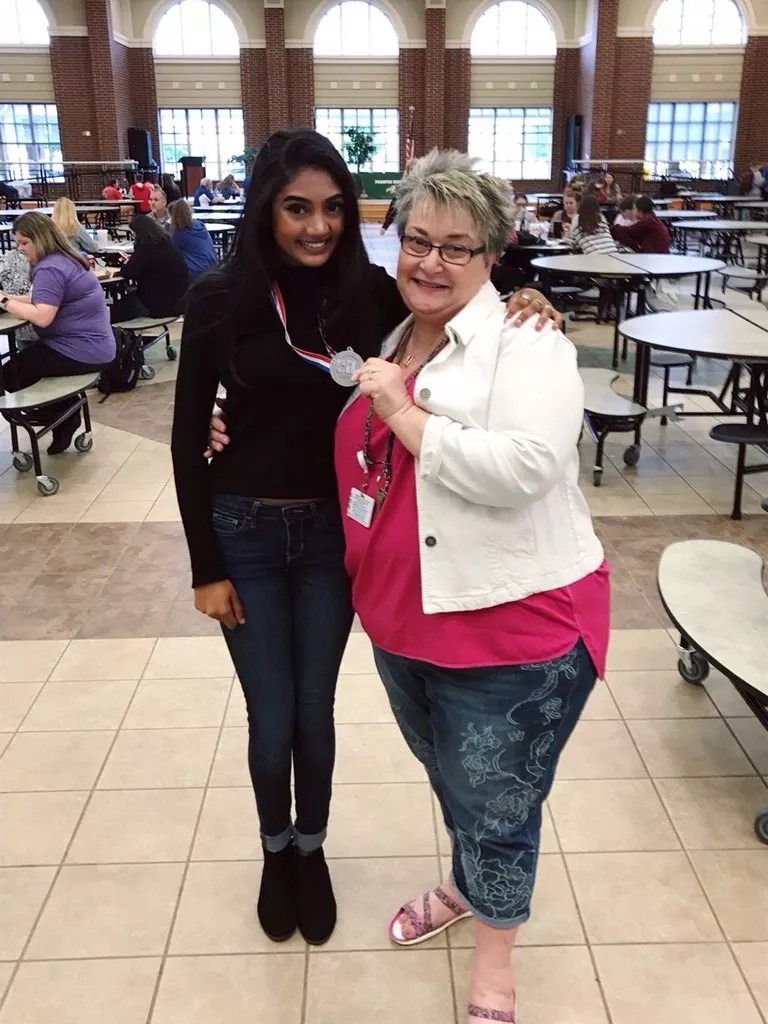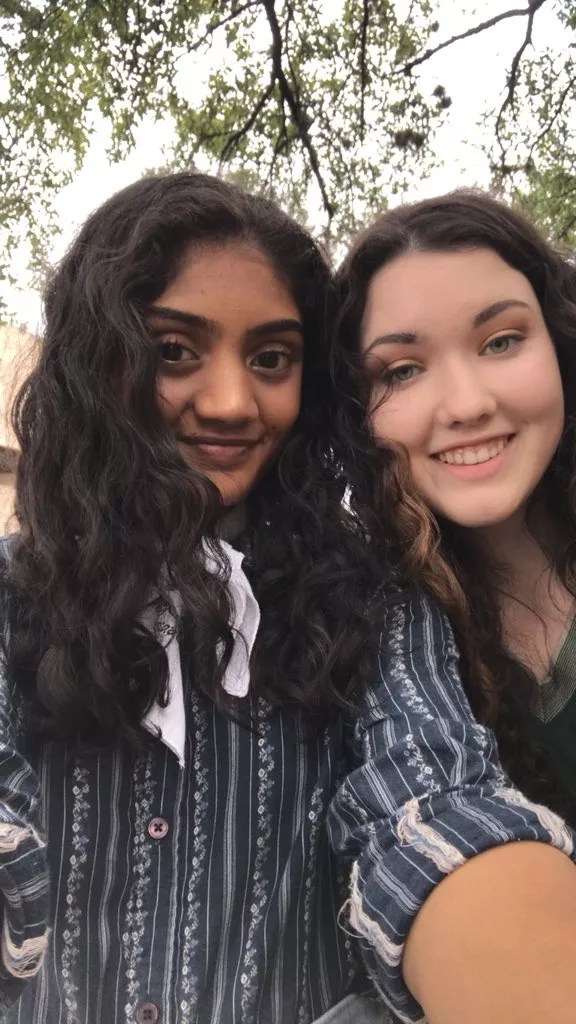
courtesy Neha Madhira

Audio By Carbonatix
The staff of Prosper High School’s student news website Eagle Nation Online has racked up an impressive number of awards and a reputation for reporting on more than just pep rallies and school events. The students dig deep for sources on stories such as a report on how teachers “strongly suggested” that students stay in their classrooms during National Walkout Day protests and the reasons behind the dismantling of the school’s Red Cross Club.
“I want to pursue journalism,” says junior Haley Stack, who serves as the newspaper’s assistant editor. “I just like that I have the opportunity to deliver people their information and tell them what’s going on in the school. It makes me feel good to be able to deliver the information to everyone and know that it’s the truth.”
After this school year, however, the newspaper staff members are telling a different kind of story to school administrators, the Student Press Law Center and other members of the media after the school’s new principal, John Burdett, tried to suppress some of the stories and editorials because he felt they didn’t paint the school in the brightest of lights.
“A lot of what he did was unlawful and pushing on the legal border of censorship,” says senior and editor-in-chief Neha Madhira.
The school year ended with Burdett pulling his recommendation for the staff’s revered adviser and the school’s seasoned journalism teacher, Lori Oglesbee-Petter, whom the Journalism Education Association named national yearbook adviser of the year in 2009 for her work at McKinney High School. That year, she and her students had to redo an entire yearbook at the tail end of the school year after the publishing company altered several students’ photos. She also won the Texas Association of Journalism Educators’ Texas journalism teacher of the year award in 2005, according to her Prosper High School profile page.
Burdett’s problems extended to three stories published during the school year. Burdett joined the school at the start of the 2017-18 school year, replacing Gregory Wright, who retired in 2017. Stack says Wright supported the student paper staff members, who have won more than 175 awards in University Interscholastic League competitions under Oglesbee-Petter’s lead.
“He was very supportive of us,” Stack says about Wright. “Any time we got any achievements, he would text someone to say congratulations and stop us in the hall to say congratulations.”
Burdett, however, wasn’t as congratulatory with the team or the teacher.
“He isn’t supportive of us,” Stack says about Burdett. “It’s rare if he ever said congratulations to us. He did not want to see us write certain things. He’s pretty much the exact opposite.”
“It’s rare if he ever said congratulations to us. He did not want to see us write certain things.” – Prosper student journalist Haley Stack
The problems with Burdett started in October over a story about a mismanaged senior movie day tradition that the principal blamed on the previous school administration.
“The tradition was something the senior class had, and he wanted to cancel it and didn’t tell the seniors, so we wanted to get the story out there, and in the interview, he said it had been known for a week and a half, and the new administration blamed the old administration,”
Burdett’s communications with the staff took place only through Oglesbee-Petter until a few months later when the problems increased and Burdett “blamed her for all the censorship and any story he didn’t like,” Madhira says.
“We didn’t know how to act, so we just tried to move forward,”
In February, Burdett spoke up again over an editorial by Stack about the school’s decision to remove the novel A Separate
“She wrote an editorial and opinion piece about why the book should not be removed from the list because in her class, and what she heard from other students and parents, people would stand up and say the book was too gay and that they chose not to read it because it made them uncomfortable,”
Through Oglesee-Petter, Burdett ordered the staff to remove the editorial from the website. Stack says Burdett told her in person that he wanted the story removed because it was factually incorrect and he was concerned about several grammatical errors. The editorial only had two errors: a missing apostrophe and an extra period at the end of a sentence, both of which were corrected on the website.
“He was very condescending,” Stack says. “While we were talking, he was just looking down on me the whole time. He’s taller than me, but he would lean down in a way and talk very calmly and quietly. It made me feel like a child almost, which I am, but in a very rude way.”
From then on, Burdett ordered Oglesbee-Petter and the newspaper staff to send him any story that was “controversial or against community norms” before they published it, Madhira says.
“We didn’t know what community norms really meant,”

Madhira (left) and junior Haley Stack, assistant editor, say their new principal has not been very congratulatory of their efforts to publish an award-winning student news website.
courtesy Neha Madhira
The final incident occurred in March over a news story about teachers trying to stop students from participating in the April 20 National Walkout Day protests over gun violence. It was just a few days before the staff headed to the UIL regional competition. The report included interviews with Burdett, who denied claims that students were warned they would be punished for participating in the protests. Two days after the story ran, Burdett organized a moment of silence rally inside the school that he called a “team bonding experience,”
The event did not go as smoothly as planned. Madhira says that “none of the classes were taking the team bonding activities seriously.” She says it seemed strange to have the event just a few months before the end of the school year, and one student gave a Nazi salute and sang a “Heil Hitler” song during the moment of silence. The school also had a fashion show scheduled in a nearby arena at the same time, and the music from the show bled into the solemn event. The newspaper wrote an editorial about the mismanaged event, but students never got to read it because Burdett refused to let the staff publish it.
Madhira says she and Oglesbee-Petter met with Burdett in person.
“He started treating me the way he treated Mrs. O,” she says. “He was shaking the paper and asked me what the purpose of the editorial was three or four times. He asked seven or eight questions about the editorial that he wouldn’t let me answer. Whenever he was done talking about it, he took the editorial and said this wouldn’t be published because it was negative and I, as a writer, was always looking for the negative in my writing and how is this uplifting for the school?”
The staff also learned Oglesbee-Petter might not return the next school year because Burdett pulled his recommendation for her service to the district. Oglesbee-Petter declined to comment and deferred all questions to the student newspaper staff.
“The day after we won back-to-back championships, he called Oglesbee into his office, and we thought it was because he was going to congratulate us on a district championship, but it was to tell her that he wasn’t going to recommend her to come back next year,”
The news was devastating for students like Madhira, who calls Oglesbee-Petter “basically my second mother.”
“I basically lived in that classroom for two years,”
Burdett brought
“I compete in editorial writing for UIL,” Stack says. “Not being able to write editorials for the paper makes me feel unprepared for competitions because I can’t write them every day.”
Mike Hiestand, the senior legal consultant for the Student Press Law Center headquartered in Washington, D.C., says he the principal’s motives for censoring stories and editorials are clear: public relations.
“He wants to run a public relations program where students are putting out the school district newsletter, so let’s be upfront with their labeling.” – Mike Hiestand, Student Press Law Center
“He wants to run a public relations program where students are putting out the school district newsletter, so let’s be upfront with their labeling,” Hiestand says. “The students are supposed to be practicing journalism, and that’s not what’s happening here.”
Hiestand says Burdett’s actions could lead to potential legal problems for the school and the district although the “law for many student journalists is not particularly good.”
The Supreme Court’s 1988 decision in Hazelwood School District v. Kuhlmeier ruled that school officials can prevent the publication of school newspaper articles, but Hiestand says officials must have “a reasonable educational justification for their censorship.
“Censorship of a student publication just because they are afraid of bad public relations or simply because a story makes a school look bad, that’s not a reasonable educational justification for censorship,” he says.
Some states have laws that provide protections to student journalists. According to the SPLC legislative advocacy group New Voices, only 15 states have anti-censorship laws to protect student journalists and five state legislatures are considering passing student journalist protection legislation.
The state of Texas isn’t on either of those lists, but Hiestand says, “This is the sort of story that might change that.”
So far, neither Prosper High School nor the Prosper school district seems interested in making changes or even speaking about the students’ worries. The newspaper staff released letters to Burdett and the school board in the wake of Oglesbee-Petter’s pending forced retirement and Burdett’s orders for the paper’s continued operation, but the students have yet to receive a response from either entity. Burdett and the Prosper school district also did not respond to several of the Observer‘s requests for comment.
“We just feel like we aren’t allowed to write the truth every time we try and write about something that doesn’t look good on the school,” Stack says. “With having prior review and having to take down stories, we just feel like we can’t write the truth anymore.”
The paper has received support outside the school and the district from groups like the SPLC and New Voices, as well as the Prosper Press newspaper, which is giving students print space to publish editorials that Burdett won’t allow on the student newspaper’s website.
Madhira says she and her staff will always have a newspaper for Prosper High School’s students.
“We’re just doing what we’re taught to do,” she says. “We’re still reporting news and features weekly. We’re still uploading slideshows and tweeting events happening over the summer.”